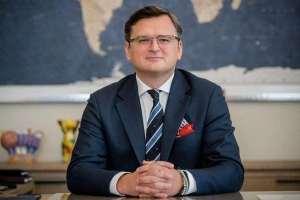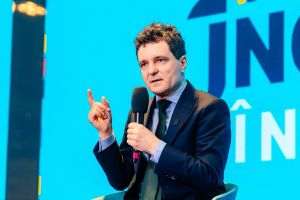
The same electoral program is adopted by two presidential candidates, two opponents who were once together - George Simion and Călin Georgescu both support the "Food-Water-Energy" political program (see Program Summary), which proposes a national development strategy based on the valorization of Romania's natural resources, aiming to ensure economic self-sufficiency, environmental protection and national independence.
The situation with two rivals on one and the same electoral program is unique, but it does us no harm and is not forbidden.
In fact, if all the candidates adopted one and the same program, the political competition would theoretically be simplified, reducing it to a comparison between the human qualities of the politicians who are asking for votes.
Theoretically.
Because, in fact, practically, this is what happens.
Political competition has been simplified for a long time, because no one takes political programs into account.
All normal citizens have understood that political programs are just false electoral promises, a kind of formal obligations that must be checked, like that, by the eyes of foreigners.
Simion and Georgescu, however, dispute their entitlement to the Program entitled "Food-Water-Energy", so that, although Călin Georgescu calls it "my program", George Simion nevertheless stated that it was drawn up by Ovidiu Hurduzeu, a member of the AUR party.
On the other hand, this same Ovidiu Hurduzeu attributes the Program to Georgescu: "The Country Project "Food-Water-Energy" of Dr. Călin Georgescu [...]"
In what follows I will show that it would have been better for AUR to think of a different electoral Program, because the "Food-Water-Energy" Program was not only derived by Georgescu from a globalist concept, not only is it convergent in effect with a Soviet program from the sixties, but it is a lame program, the application of which could not achieve its declared goal, that of Romania's economic autonomy.
• "Food-Water-Energy" is derived from the globalist concept "Food-Water-Energy Nexus"
The title "Food-Water-Energy" is taken by Călin Georgescu from the globalist concept "Food-Water-Energy Nexus" (see Concept Presentation), which began to be developed around 2011, especially by international organizations such as the World Economic Forum and the World Energy Council.
The "Food-Water-Energy Nexus" concept is a theoretical response to global population growth, climate change, accelerated urbanization and pressures on natural resources, which, as its promoters argue, have imposed the need to manage food, water and energy resources in an interdependent manner.
The concept of the "Food-Water-Energy Nexus" was popularized at the United Nations Conference on Sustainable Development Rio+20 in 2012.
The World Economic Forum played a key role in promoting it, integrating the concept into global sustainability reports.
Călin Georgescu's "Food-Water-Energy" program and the "Food-Water-Energy Nexus" concept share similarities, but lead to opposite results due to differences in application.
Both recognize the critical interdependencies between food, water and energy and emphasize the need for integrated management of these resources to ensure long-term sustainability.
However, the Nexus pursues global and collaborative solutions, based on technological innovation and international interconnection, to address planetary challenges such as climate change and resource scarcity.
In contrast, Georgescu's program emphasizes national self-sufficiency, promoting traditional values and a form of moderate protectionism that could lead to economic isolation, which limits openness to global cooperation and innovation.
While the Nexus aims to support global competitiveness through sustainable integration, Georgescu's program risks reducing Romania's adaptability and competitiveness by focusing exclusively on its own resources. Thus, although inspired by the Nexus structure, Georgescu's program changes direction towards a relatively isolationist strategy, with possible negative long-term effects, contrary to achieving economic independence, forcing us to an agrarian specialization.
• The reduction in agriculture, planned by the Soviet Union for Romania, present in the "Food-Water-Energy" Program
Agriculture was the economic destination reserved for Romania, outlined by the "Valev Plan" (see Summary) in the sixties of the last century, through which the Soviet Union wanted to create mutual dependencies between the countries of the socialist camp, centrally administered from Moscow.
The same unilateralism of the Romanian economy is also promoted by the "Food-Water-Energy" Program, because, although it aims at self-sufficiency in agriculture, it has significant limitations in terms of industrial independence.
Without an industrial development component, the program could bring Romania into a situation of enslaving dependence on imports of industrial products and technologies, similar to what the Valev Plan proposed.
Practically, the adoption of the "Food-Water-Energy" Program of Călin Georgescu and the AUR party, as a national strategy, abstracts us from the economic trends of the European Union, not only by exiting international supply networks, but also by the opposite direction foreshadowed by this year's "Future of European Competitiveness" Report (see BURSA/November 18/"Letta Report and Draghi Report versus Romania" - Theodor Stolojan), coordinated by Mario Draghi and made public in September.
• The Romanian Economy's Exit from the EU
The Draghi Report states that the European economy has remained stuck in traditional industries, with limited possibilities to innovate and develop new technological breakthroughs, those with high potential to increase productivity.
The report recommends investments in digitalization, decarbonization and the circular economy, that is, exactly the areas ignored by the "Food-Water-Energy" Program (see what "Digitalization, decarbonization and the circular economy" consists of).
Mario Draghi recommends this effort so that Europe does not remain "on the sidelines" with the US and China, which may be a stupid, superficial reason, if the effort burdens European citizens and brings them trouble.
But the trouble also comes from Europe's dependence on the economies that have taken the lead, those of the US and China.
Likewise, Romania's regression in agriculture, without paying sufficient attention to industry and its current trends, may bring trouble to our citizens, because it produces the opposite effect to the one intended: instead of gaining our independence, paradoxically, the so-called "self-sufficiency" makes us dependent on foreign industrial producers, inventions and technologies, at the very time when they are exploding.
Instead of integrating, we would be excluding ourselves.
On the other hand, the "Food-Water-Energy" Program raises some problems regarding its practical application and presents some theoretical insufficiencies, not being up to date with research in polycentric governance.
Beyond the Program, Georgescu promotes naiveties like "Romanian entrepreneurs must own 51% in any kind of partnership", which represents an aberrant interference in private business and proves that, come on!, theory, as theory, but practice kind of kills it.
Because Georgescu has not heard that it is possible, for example, to control a company by owning only 5% of its shares.
Well, this is a detail not only practical, but also theoretical...
• Critical observations
While it aims to capitalize on food sovereignty and natural resources, the Program has significant limitations.
It focuses on agriculture and primary resources, ignoring the development of advanced industries and modern technologies, such as IT, artificial intelligence, and lacking state-of-the-art details on green energy and energy storage.
The focus on self-sufficiency may also affect economic competitiveness by neglecting integration into global value chains (see Global Value Chains - Summary).
Global Value Chains (GVCs) are decentralized and interconnected economic networks, where countries contribute to different stages of global production according to their comparative advantages (resources, technology, skilled labor, etc.).
Unlike the Valev Plan, global value chains are the result of voluntary collaboration between countries and companies, guided by the market and global demand, without centralized coordination.
The difference in nuance is radical, as one is subordination through dependence and another is integration in a freely negotiated collaborative process.
GVCs favor economies that can contribute products or services from advanced sectors, such as information technology, sophisticated industrial components, or manufactured goods.
An economy focused on the primary sector, such as the one promoted by "Food-Water-Energy", would have difficulty integrating effectively into these chains. Without participation in GVCs, an economy risks becoming isolated, which can limit diversification and economic growth in the long term.
Thus, the Program of the two presidential candidates offers an incomplete vision for a modern and diversified economy.
However, although there are points of tension, an economy based on "Food-Water-Energy" could partially integrate into global value chains through:
- Specialization in strategic sectors: Romania could contribute with ecological agricultural products or renewable energy, which are sought after globally.
- Investment in technology and advanced industries: Including a strategy for technological development could allow participation in more complex stages of global chains.
- Selective collaboration: Romania could choose to participate only in sectors that do not contradict self-sufficiency priorities.
- On the other hand, the research of the Nobel Prize laureate in economics (2009), Elinor Ostrom, on polycentric governance (see Abstract) would have been extremely relevant for improving the "Food-Water-Energy" Program proposed by Călin Georgescu, leading to:
- Increased sustainability: Local communities would have a direct interest in conserving resources, reducing the risk of unsustainable exploitation.
- Efficiency in the use of resources: Decentralized management allows for solutions adapted to local specificities, which would lead to more efficient use of resources.
- Increased civic involvement: Through active participation, communities would be more accountable and would have a direct role in the success of the program.
- Conflict reduction: Local conflict resolution mechanisms could prevent tensions over resource use.
Elinor Ostrom's research has fundamentally changed the understanding of how common resources are governed and has demonstrated that local solutions, based on polycentric governance, can be more effective than centralized or completely deregulated models.
In practice, they have led to more adaptable, sustainable and participatory governance models, influencing public policies globally.
The integration of Ostrom's principles into the Political Program of the two candidates for the Romanian presidency would have brought clarity on resource governance and offered effective solutions for involving local communities in sustainable resource management, without creating exclusive dependence on central authorities.
The absence of references in the "Food-Water-Energy" Program to the concept of polycentric governance, 15 years after the Nobel Prize was awarded (in recognition of the theoretical and practical value of research on this subject), reveals deficiencies in the author's interest and economic culture, which was limited to the "Food-Water-Energy Nexus".
Of course, any Program can be improved, but this one has not been improved for eight years.
• A pastoralist Program
The "Food, Water, Energy" Program expresses a critical attitude towards globalization, industrialization and excessive technologization, seeing in them a threat to traditional values, similar to the rejection of modernity encountered in pastoralism.
The program places particular emphasis on agriculture and rurality, seen as the foundation of the economy, similar to the pastoralist ideology, which glorifies the deep connection with the land and traditional village life.
The author mixes undigested biblical principles with the life of peasants and agriculture, leaving the impression that, outside the village, authentic Christianity cannot be practiced.
However, I note two good things:
1. The fact that this political program was produced; it exists (unlike the public manifestations and declarations of its author, the program presents a certain coherence and can be taken as a basis for discussion).
2. The fact that its adoption as a government program is extremely unlikely, because neither Simion nor Georgescu seem to be favorites in the electoral race, so we need not fear that someone will try to apply it.
























































1. fără titlu
(message sent by Este programul domnului Georgescu on 19.11.2024, 08:22)
Nu mai mintiti. E programul domnului Georgescu!!!
1.1. fără titlu (response to opinion no. 1)
(message sent by MAKE on 19.11.2024, 09:01)
Mens sana in corpore sano.
Cred ca tie ti-a ramas numai corpore sano.
Scrie in articol ca nu-i al lui?
Asa va invata Georgescu sa mintiti?!
Ia intreaba-l!